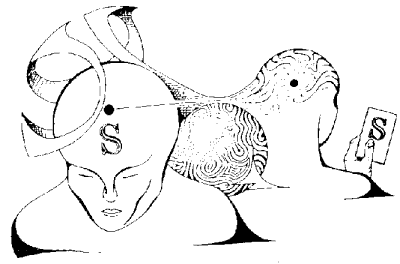 |
Science Frontiers ONLINE No. 35: Sep-Oct 1984 |
|
|
Parapsychology: a lack-of-progress report
Speculating, as in the above item, is fun; but we need something to deflate balloons before they drift too high into the wild blue. The Skeptical Inquirer is the perfect "something." In the latest issue, ESP or psi takes it on the chin. J.E. Alcock reviews the last 8 years of parapsychological research. His conclusion:
"The past eight years have been no kinder to those seeking compelling evidence about the reality of paranormal phenomena than were the previous eighty: The long-sought reliably demonstrable psychic phenomenon is just as elusive as it always has been."
Alcock believes that parapsychology is on the ropes and must grasp at straws. One of these straws is the enthusiastic espousal of those quantum mechanical effects which seem to transcend time, space, and even human comprehension. Alcock contends that the admitted enigmas of quantum mechanics are being unfairly twisted by the parapsychologists.
[Parapsychologists and their critics will argue interminably about the applicability of quantum mechanics to psi, ceasing only when someone with powerful, undeniable psi powers comes along -- the equivalent of a UFO landing on the White House lawn.]
Meanwhile, Alcock identifies an important characteristic of psi, which is truly anomalous, for it is completely foreign to science as we understand it today. This is the generalizability of psi.
"...psi effects turn up whether one uses cockroaches or college students, whether the effects are to be generated in the present or the future or the past, whether the subjects know that there is a random number generator to be affected, whether a sender and receiver are inches or continents apart..."
Alcock believes this generalizability of psi weakens the case for its existence. He attributes any non-chance effects in psi research to bad experiment design and to the vicissitudes of chance itself.
(Alcock, James E.; "Parapsychology's Past Eight Years: A Lack-of-Progress Report," Skeptical Inquirer, 8:312, 1984.)
Comment. If psi effects are real and also transcend our usual concept of causality and the space-time framework, the conventional scientific approach really becomes impossible. For example, the results of an experiment could be modified by someone in the future -- so-called retroactive psychokinesis! Psi when completely generalized is independent of humans and other life forms. It is then a general property of the cosmos -- a certain tendency of lists made by people, random-number generators, and similar sources to match up in non-chance ways. If this tendency is real, the laws of chance to not truly reflect the way the cosmos works. There is, after all, no absolute requirement that mathematics be a faithful mirror of reality. Reality is reality; and theory is, well, something the left side of the brain is good at generating.
 | John Holden's rendition of 'telepathy'. |